The FIBT World Championships 2008 ran February 11–24, 2008 in Altenberg, Germany for the fifth time, having done so in 1991 (bobsleigh), 1994 (skeleton), 1999 (skeleton), and 2000. It is the first time Altenberg has hosted all of those events at one championship, and also includes the mixed team event that debuted at the 2007 championships. Training for the events took place February 12–14 for two-man and two-woman bobsleigh, and February 19–20 for skeleton and four-man bobsleigh.
The FIBT World Championships 2011 took place 14 February – 27 February 2011 in Königssee, Germany, for the fifth time, doing so previously in 1979, 1986, and 1990 (skeleton), and 2004. In 2007, the championships were awarded to Cortina d'Ampezzo, Italy over Winterberg Germany, but Cortina withdrew in February 2009 to a series of issues.
The FIBT World Championships 2009, officially known as the Bauhaus FIBT Bobsleigh & Skeleton World Championships, February 20 to March 1, 2009, at the bobsleigh, luge, and skeleton track in Lake Placid, New York, for the ninth time, doing so previously in 1949, 1961, 1969, 1973, 1978, 1983, 1997 (skeleton), and 2003. Lake Placid was chosen 25–11 over Igls, Austria.

The Altenberg bobsleigh, luge, and skeleton track is a venue in Germany for bobsleigh, luge, and skeleton. Located in Saxony in eastern Germany, it is northwest of Altenberg, near the border with the Czech Republic.

The Königssee bobsleigh, luge, and skeleton track is a venue in Germany for bobsleigh, luge and skeleton, located in Schönau am Königssee, Bavaria, near Königssee and the border with Austria. Completed 57 years ago in 1968, it is the first permanent, artificially refrigerated bobsleigh, luge, and skeleton track in the world. In July 2021, the track was severely damaged by the floods that affected the European continent, and is currently under reconstruction.
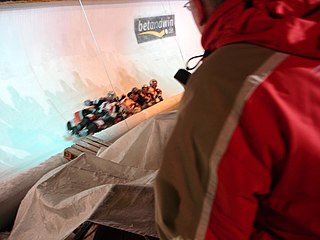
The Olympic Sliding Centre Innsbruck is a venue for bobsleigh, luge and skeleton located in Igls, Austria. The most recent version of the track was completed in 1975 and is the first permanent, combination artificially refrigerated bobsleigh, luge, and skeleton track, serving as a model for other tracks of its kind worldwide. It hosted the bobsleigh, luge, and skeleton competitions for the 2012 Winter Youth Olympics.

The Mt. Van Hoevenberg Olympic Bobsled Run is a venue for bobsleigh, luge and skeleton in the United States, located at the Lake Placid Olympic Sports Complex in Lake Placid, New York. This venue was used for the 1932 and 1980 Winter Olympics and for the only winter Goodwill Games in 2000. The track hosted both the first FIBT World Championships and FIL World Luge Championships held outside of Europe, doing so in 1949 and 1983. The third and most recent version of the track was completed in 2000. In 2010 the bobsled track was listed on the National Register of Historic Places.

The Eugenio Monti Olympic Track was a bobsleigh and skeleton track located in Cortina d'Ampezzo, Italy. It was named after Eugenio Monti (1928–2003), who won six bobsleigh medals at the Winter Olympic Games between 1956 and 1968 and ten medals at the FIBT World Championships between 1957 and 1966. It was featured in the 1981 James Bond film For Your Eyes Only, held after the 1981 FIBT World Championships, before the track was shortened to its current configuration. In January 2008, after one last bobsleigh race tournament, the track was closed.

The Whistler Sliding Centre is a Canadian bobsleigh, luge, and skeleton track located in Whistler, British Columbia, that is 125 km (78 mi) north of Vancouver. The centre is part of the Whistler Blackcomb resort, which comprises two ski mountains separated by Fitzsimmons Creek. Located on the lowermost slope of the northern mountain, Whistler Sliding Centre hosted the bobsleigh, luge, and skeleton competitions for the 2010 Winter Olympics.
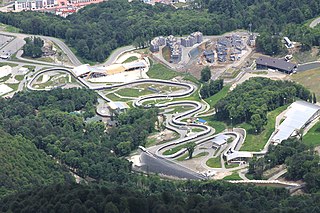
The Sliding Center Sanki (Санки) is a bobsleigh, luge, and skeleton track located in Rzhanaya Polyana, Russia, 60 km (37 mi) northeast of Sochi. Located in the Western Caucasus. The venue hosted the bobsleigh, luge, and skeleton events for the 2014 Winter Olympics.
The bobsleigh competition of the Vancouver 2010 Olympics was held at the Whistler Sliding Centre between 20 and 27 February 2010.
The skeleton competition of the Vancouver 2010 Olympics was held at Whistler Sliding Centre. The events were held between the 18 and 19 February 2010. This event was expanded to four runs over two days beginning at these Olympic Games.
The 2009–10 Bobsleigh World Cup was a multi race tournament over a season for bobsleigh. The season started on 12 November 2009 in Park City, Utah, United States and ended on 24 January 2010 in Igls, Austria. The World Cup was organised by the FIBT who also run world cups and championships in skeleton. For this season, it was sponsored by Intersport.
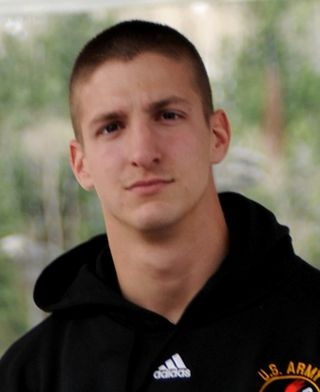
John Napier is an American bobsled driver and a soldier in the U.S. Army World Class Athlete Program. He won the two-man event at the 2009 U.S. National Bobsled Championships with Cory Butner. At the 2009 FIBT World Championships, he placed 17th in the two-man event with T.J. Burns and 11th in the four-man event with Jesse Beckom, Jamie Moriarty, and Nick Cunningham.

The four-man bobsleigh competition at the 2010 Winter Olympics in Vancouver, British Columbia, Canada, was held at the Whistler Sliding Centre in Whistler, British Columbia, on 26–27 February. The German team of André Lange, René Hoppe, Kevin Kuske, and Martin Putze were the defending Olympic champion in this event. America's team of Steve Holcomb, Justin Olsen, Steve Mesler, and Curtis Tomasevicz were the defending world champions in this event. The test event was won by the Latvian team of Jānis Miņins, Daumants Dreiškens, Oskars Melbardis, and Intars Dambis. The last World Cup event prior to the 2010 Games place took place in Igls, Austria on 24 January 2010 and was won by the German team of Lange, Hoppe, Kuske, and Putze. Holcomb of the United States won both the four-man and the combined World Cups.
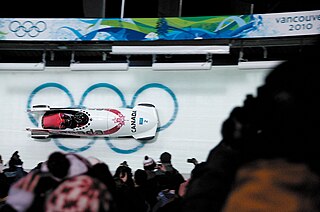
The two-woman bobsleigh competition at the 2010 Winter Olympics in Vancouver, British Columbia, Canada, was held at the Whistler Sliding Centre in Whistler, British Columbia, on 20–21 February.

The men's skeleton event at the 2010 Winter Olympics in Vancouver, Canada, took place at the Whistler Sliding Centre on 18–19 February. Canada's Duff Gibson was the defending Olympic champion. Gibson retired after the 2006 Olympics. Switzerland's Gregor Stähli, the defending Olympic bronze medalist was the defending world champion, but did not compete due to a thigh injury sustained during the World Cup event in Lake Placid, New York, on 20 November 2009. The test event held at the venue was won by Jon Montgomery of Canada. The last World Cup event prior to the 2010 Games took place in Igls, Austria, on 23 January 2010 and was won by Latvia's Martins Dukurs who also won the overall World Cup title.

The women's skeleton event at the 2010 Winter Olympics took place at the Whistler Sliding Centre on 18–19 February. The competition was won by British athlete Amy Williams, who set new course records for the track on her first and third runs. Williams, who had never before won a World Cup or World Championship event, became the first British athlete to win a solo Winter Olympic gold medal in 30 years. German sliders Kerstin Szymkowiak and Anja Huber won the silver and bronze medals respectively. Williams' teammate Shelley Rudman, who had won the silver medal at the 2006 Winter Olympics, and Canadian Mellisa Hollingsworth, both of whom had been expected to be in medal contention, were disappointed.
The men's luge at the 2010 Winter Olympics took place on 13–14 February 2010 at the Whistler Sliding Centre in Whistler, British Columbia. Germany's Felix Loch was the two-time defending world champion and won the gold medal with the fastest time in each of the four runs. The test event that took place at the venue was won by Germany's David Möller, who would win the silver medal in this event. Italy's Armin Zöggeler was the two-time defending Olympic champion and won a bronze medal in this event. The last World Cup event prior to the 2010 games took place in Cesana, Italy on 30 January 2010 and was won by Zöggeler, who also won the overall World Cup title.
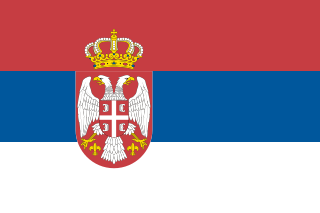
Serbia participated at the 2010 Winter Olympics in Vancouver, British Columbia, Canada. It was the first time the nation had participated in the Winter Olympics after competing as Serbia and Montenegro in the previous Olympics.














